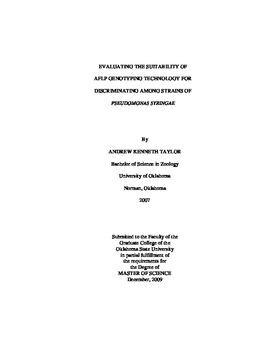| dc.contributor.author | Taylor, Andrew | |
| dc.date.accessioned | 2014-04-17T20:11:57Z | |
| dc.date.available | 2014-04-17T20:11:57Z | |
| dc.date.issued | 2009-12-01 | |
| dc.identifier.uri | https://hdl.handle.net/11244/10310 | |
| dc.description.abstract | This study was designed to assess the suitability of amplified fragment length polymorphism (AFLP) analysis for discriminating among strains of Pseudomonas syringae pathovar (pv.) tomato , a species of plant pathogenic bacteria. 14 strains of P. syringae pv. tomato were used as model plant pathogens to assess the reliability and discriminatory power of the assay. DNA was extracted using organic extraction and quantitated using spectrophotometry. The strains were processed using the AFLP Microbial Fingerprinting kit from Applied Biosystems. Capillary electrophoresis and GeneMapper ID software were used to analyze the data. The AFLP profiles generated in this study exhibited over 95% reproducibility through three replicate assays done on each bacterial strain. Visual comparisons of electropherograms, as well as the use of a numerical haplotype code describing the AFLP profiles, showed that all P. syringae pv. tomato strains tested were distinguishable from on another. The discriminatory power of the AFLP assay was characterized through pairwise comparisons of haplotype codes among all 14 strains of P. syringae pv. tomato . Power was also assessed across species by comparing haplotype codes of P. syringae pv. tomato with the codes of eight strains of Serratia marcescens and three strains of Staphylococcus aureus . The assay discriminated 100% of the P. syringae pv. tomato strains tested, as well as 100% of the strains across the three species mentioned above. The technology provided a probability of exclusion of 100% in practice (with the lower interval of a 95% C.I. equal to 98.35%) within the P. syringae pv. tomato species and 100% (with the lower interval of a 95% C.I. equal to 99.5%) across the three species. AFLP technology is therefore reliable and sufficiently powerful for routine use in microbial forensics. | |
| dc.format | application/pdf | |
| dc.language | en_US | |
| dc.publisher | Oklahoma State University | |
| dc.rights | Copyright is held by the author who has granted the Oklahoma State University Library the non-exclusive right to share this material in its institutional repository. Contact Digital Library Services at lib-dls@okstate.edu or 405-744-9161 for the permission policy on the use, reproduction or distribution of this material. | |
| dc.title | Evaluating the Suitability of AFLP Genotyping Technology for Discriminating Among Strains of Pseudomonas syringae | |
| dc.type | text | |
| osu.filename | Taylor_okstate_0664M_10593.pdf | |
| osu.college | Center for Health Sciences | |
| osu.accesstype | Open Access | |
| dc.description.department | School of Forensic Sciences | |
| dc.type.genre | Thesis | |
| dc.subject.keywords | aflp | |
| dc.subject.keywords | agriculture | |
| dc.subject.keywords | forensic | |
| dc.subject.keywords | genotyping | |
| dc.subject.keywords | pseudomonas | |
